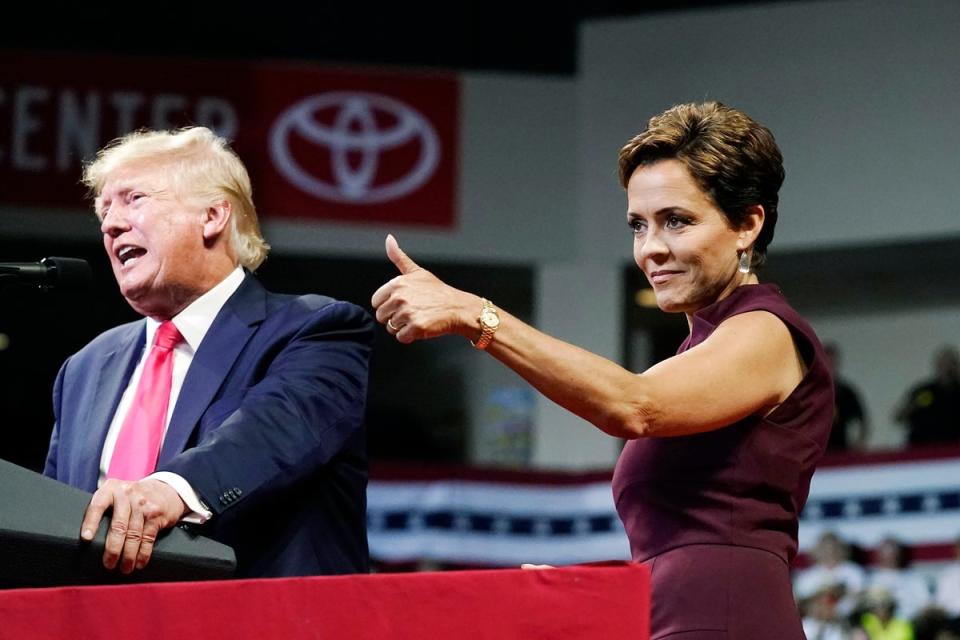Voters in 27 states have election deniers on their ballots who could determine 2024 results, report finds
- Oops!Something went wrong.Please try again later.
- Oops!Something went wrong.Please try again later.
As primary races come to a close heading into November’s general elections, Americans in at least 27 states will see candidates on their ballots who have denied the outcome of the 2020 presidential race, according to a new report.
At least 43 candidates for statewide offices that oversee election administration – including governor, secretary of state and attorney general – have amplified baseless claims that President Joe Biden was fraudulently elected and relied on conspiracy theories with spurious claims of voter fraud in their campaigns.
If elected, those officials would have the ability to certify or reject the outcome of future elections, file election-related lawsuits and prosecute election workers – including in 2024, when Donald Trump could mount a re-election campaign.
“A single [election denier] winning a statewide office in a single state is a five-alarm fire for our democracy,” Joanna Lydgate, CEO of States United Action, said in a statement accompanying the report.
“Experience and polling tells us some of these races will be very close,” she said. “Many of these down-ballot contests had narrow margins in the last midterm election, and voters can’t afford to sit these races out.”
The report from States United Democracy Center, which has closely tracked the progress of election-denying candidates across the US, finds that 18 of 26 races for governor this year include at least one candidate who has cast doubt on the legitimacy of the 2020 election.
One-third of all races for attorney general include at least one such candidate, and 12 out of 27 races for secretary of state – an office that is typically charged with election administration – include election-denying candidates.
Those candidates are running for all three top statewide positions in at least three states.

Arizona’s Republican nominees for those top three statewide offices include gubernatorial candidate Kari Lake, secretary of state candidate Mark Finchem, and attorney general candidate Abraham Hamadeh – all of whom baselessly stated that the 2020 election was stolen from Donald Trump. All were endorsed by the former president.
GOP nominees for those same offices in Michigan and Alabama have made similar false claims central to their campaigns.
The report follows recent analysis from pro-democracy groups finding that GOP-controlled state legislatures introduced at least 244 bills to undermine the electoral process and hand oversight of elections to partisan officials. Twenty-four such bills became law.
That state-level effort “would make it far easier for hyperpartisan actors to stir up the doubt, chaos, and confusion that could be used as a pretext for election subversion,” according to the report.
Election experts and elected officials have also sounded the alarm, warning that the explosion of legislation – and a wave of prominent election deniers running for office to put it in place – give antidemocratic actors the tools to do what failed attempts to overturn the 2020 results could not, and with a greater chance of success.
There also is substantial overlap between states with election-denying candidates on November ballots and legislatures that have advanced those bills, according to States United.
Arizona and Wisconsin, which have a combined four election-denying candidates running for statewide office on their respective ballots, have led the country with more than 30 election-related bills each.
Meanwhile, the recent wave of election denialism is already influencing elections and the electoral process. Years of harassment forced an entire election office in one Texas county to resign, and election workers are reporting growing threats of abuse fuelled by conspiracy theories.
Members of Congress currently are working to reform the Electoral Count Act, an archaic 19th century law that Mr Trump and his allies sought to exploit by pressuring Mike Pence to block the certification of votes during a joint session of Congress on 6 January, 2021.
A potential rewrite of the law could, among other things, clarify that only a single slate of electors from each state can be submitted to Congress – an attempt to block out so-called “alternate” slates of “fake” electors from interfering with the process, as Republican officials promoted in an attempt to install electors loyal to the former president.
The US Supreme Court also will consider a case involving the fringe right-wing “independent state legislature” theory that voting rights advocates and pro-democracy groups have warned could make it easier for state lawmakers to reject the will of the voters and further erode basic tenets of American democracy.
“The anti-democracy playbook is simple: If you change the rules of elections, and you change the referees who oversee elections, you can change the results,” according to the States United report. “But an informed voter is a powerful voter. Pro-democracy candidates of both parties are on the ballot this fall. It’s never been more important for our state leaders to believe in free, fair, and secure elections.”

